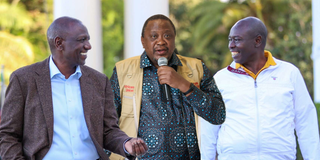Premium
Ruto’s tight rope as Mt Kenya's 'one man, one vote, one shilling' debate rages on

President William Ruto (left), former President Uhuru Kenyatta (centre) and Deputy President Rigathi Gachagua. Pundits warn that Uhuru and his allies are casting President Ruto as a bet they had warned Mt Kenya residents against.
The one man one shilling one vote debate going on in Mt Kenya region is such a minefield that the political careers of those in government today are now at risk.
During his campaigns in the region, President William Ruto told voters in Mt Kenya that they were getting little cash for development because then President Uhuru Kenyatta had sunk the country into debt and allowed corruption to thrive. Now, it is his moment of reckoning.
President Ruto’s allies in government, who include Deputy President Rigathi Gachagua, Attorney General Justin Muturi, Majority leader Kimani Ichung’wa, Budget chair Ndindi Nyoro and Council of Governors chair Ms Anne Waiguru bear the highest responsibility in ensuring that this principle of resources and opportunities sharing is realised.
“Retired President Kenyatta had warned the region about this issue and wanted them to pass the Building Bridges Initiative (BBI) so that it could be entrenched into law in the proposed referendum that was so vilified…Mr Ruto’s allies in the Mountain led by Mr Gachagua trashed the recommendation and told us that it could be done in parliament. Now they are the government and the majority in that parliament. What are they waiting for?” posed Jubilee Secretary General, Jeremiah Kioni.
Pundits warn that Mr Kenyatta and his allies in the Mountain are capitalising on this debate to cast President Ruto as a bet they warned residents against, but ignored, and are therefore paying the price.
Mr Kenyatta had pitched Mr Raila Odinga as the most suitable presidential candidate for the region deputised by Martha Karua, but they were all lumped together in a heap of humiliation when Ruto and his allies emphatically defeat them.
Political analysts now fear that the retired president is working underground to capitalise on the failures of the Kenya Kwanza Alliance government while maintaining links with Mr Odinga to craft a comeback strategy aimed at making President Ruto a one term president.
The biggest challenge is on the president himself to look for the best route that can guarantee him political survival both for now and when seeking a second term. As such, it will be in his best interests to come up with a formula to address this demand in Mt Kenya.
The President came face to face with the seriousness of the debate on Friday during a burial ceremony for three-time Presidential aspirant Mr Waweru Ng’ethe in Kandara constituency. There, Governor Irungu Kang’ata, Senator Joe Nyutu and nominated MP Sabina Chege confronted him with the debate.
They cautioned President Ruto that the debate was close to the hearts of area residents, formed the basis of almost all political and economic discussions in the region, and has become the popular talk among families. When his time to address the mourners came, the President avoided the subject despite responding to all other issues raised.
“It is a tight corner he is in…he certainly won’t enjoy this new push for the one man one shilling one vote debate that has erupted in Mt Kenya region. It is the region that gave him 47 per cent of his win. But on the other hand, it was an election where every vote mattered since he won by 250, 000 votes only,” said political analyst Prof Ngugi Njoroge.
In that debate, there are other regions especially in Rift Valley, Coast and North Eastern who voted for his government but if the one man one shilling one vote principle is enacted, they would lose their allocations by big margins. They won’t take it lying down.
“This forms the basis of President Ruto’s dilemma – to upset part of his family so as to appease another part of that family. It is not a good choice in politics and it poses one of the biggest threats in his popularity in Mt Kenya,” said former long serving career administrator, Mr Joseph Kaguthi.
Mr Kaguthi said the other alternative is for President Ruto to post huge economic growth results that will retain the allocations that currently apply but increase those for heavily populated areas to the demanded levels.
Also Read: Sabina Chege - Why I 'overthrew' Uhuru
“The debate is premised on the fact that there are regions that are being allocated an average of Sh30, 000 per head while others have Sh3, 000 as their share per head. The disadvantaged regions are not exclusively in Mt Kenya, but also in Bungoma, Homa Bay, Machakos, Kakamega, Kisii, Siaya, Kisumu, Uasin Gishu, Kilifi, Bomet and Kajiado,” said Kiambu governor Mr Kimani Wamatangi, adding that, “This debate should not be made to appear as beneficial to Mt Kenya region only.”
As the debate rages, Laikipia East MP and his Githunguri counterpart Ms Gathoni wa Muchomba have revealed that the resource sharing formula is making some political bigwigs in government uneasy.
“There are about six politicians who have been marked as rebels and have been under pressure to shut up about the issue. I have made it crystal clear that I will be the last person to be silenced since we must make haste and make our voters also enjoy the warmth they accorded us by voting us into government,” said Mr Kiunjuri.
Ms wa Muchomba recently told Inooro TV that, “Personally I have been warned that I started talking too soon about the one man one shilling one vote maxim…I had declared it as an agenda immediately we were sworn in but I was told to go easy on it…But I want to give my assurance that this debate must sail through and the formula will apply before we go to vote in 2027.”





